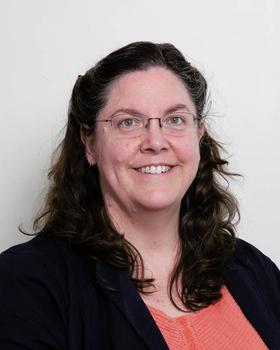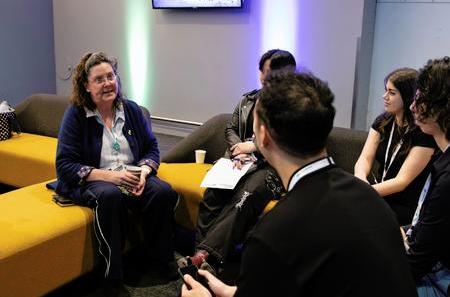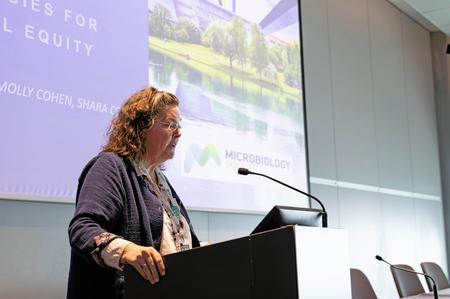Deaf Awareness Week: Sharon Brookes

Could you tell us about yourself?
I’m Sharon Brookes (-Wade); the former is my ‘working name’, the double barrelled is for my life outside of work. I am a virologist, and my 35-year post-doctoral career has been in the UK in the One Health arena.
I retired from working at the Animal Plant Health Agency (APHA) in Weybridge around a year ago, I currently hold an Associate/Visiting Professorship at the University of Surrey, UK in the School of Biological Sciences. I have one PhD student yet to complete and several manuscripts to finalise with colleagues. Happily, I was able to attend Annual Conference 2025 – my first as a retiree – this year utilising a Society Events Grant and support from Mums in Science/Women in STEM. I also sat on the Society’s Virus Division and Council in the past, I have been an Editor for Journal of Medical Microbiology and am in my final year as an Editor for Journal of General Virology.
My hearing loss has been slowly progressing, it was first detected when I was studying for my PhD, in the late 1980s, as part of an employee screening programme at CSIRO Australian Animal Health Laboraotry.
It’s Deaf Awareness Week from 5–11 May 2025; will you be doing anything to raise awareness?
For Deaf Awareness Week, I am doing an interview on trying to learn British Sign Language (long term) and continue to hone my lip-reading abilities for noisy environments, to assist the power of dual hearing aids.

As someone who has worked in microbiology and identifies as Deaf, could you tell us about some of the challenges/barriers you have faced?
Overcoming challenges is a constant and adaptive process, it was not until about five years ago that I discovered that I could/was lip reading. I learnt this as a part of a DEFRA leadership programme on which I had won a competitive place for the first group of DELTA (Disability Empowers Leadership Talent) participants, run by the Cabinet Office.
A colleague at APHA in Weybridge who is also ‘hard of hearing,’ helped me be more open about the challenges of deciphering voice in a noisy environment. This led to me obtaining some equipment – a portable loop / Roger Pen system – that made a big difference during meetings when there were multiple voices or poor acoustic venues.
Before the adaptations on the evolving quality of hearing aids, my own voice would be raised and others were unsure of my intent. I would ‘stare’ at them trying to lip read and they often thought I was shouting or had a raised voice in a negative way when communicating with them. The opposite was also true, if I could not decipher conversations then I tended to stay quiet and not contribute to discussions.
Have you found the challenges/barriers you have faced changed throughout your career?
The challenges have became less, as I learnt to adapt and became confident enough to tell others that I sometimes struggled to hear them, or decipher what was being said. Getting the assistive equipment for use at work and at home helped a lot too.
Some environments remain a challenge, a good example is the Annual Conference poster hall. These venues are always large and acoustically poor, so make hearing and conversing hard. As a younger scientist this was tough, it was easier to be a speaker for an oral presentation than try to relay my poster details in this environment. As I progressed through my career, getting an oral presentation slot and being able to deliver improved.

Is there any advice that you would give to other Deaf people who are working in (or hoping to work in) science?
The best advice is to seek out a mentor(s) that fully appreciates the challenges you face, with respect to having hearing/speech issues. This does require being open and honest with your colleagues. Tech equipment can help too; investigate what’s available and ask your employer to assist in its acquisition.
Do you think more needs to be done to support Deaf people studying or working in science?
A suggestion to help overcome the communication issues, for example in the poster hall, I'd suggest to provide a sticker for poster presenters who do have difficulty communicating (hearing/speaking). This is to put on their posters and alert readers that the person may find this challenging. Especially important if their poster is being judged for a prize!
Having the quiet spaces available is great as at times noise can become overwhelming.
When and why did you first become interested in microbiology?
During my secondary school education. Then it was cemented at university with a split major in microbiology and biochemistry, followed by the PhD in virology.
If you hadn’t gone into science, what career path do you think you would you have chosen?
My early background was in farming so probably that, but science was cemented in very early.
Find out more about the Society’s equality, diversity and inclusion initiatives and grants schemes.
